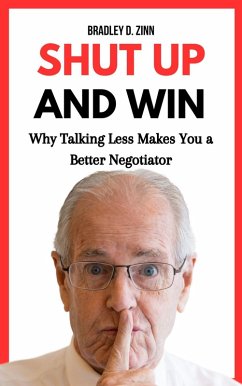Most people approach negotiations with a mindset rooted in persuasion. They try to convince, explain, and argue their way through the conversation, thinking that the right words will tip the scales in their favor. The truth is, the best negotiators rarely do all the talking. They listen more, observe closely, and respond strategically. By speaking less, they create space for understanding the other party's needs, desires, and weaknesses-insights that are impossible to gather when you're too focused on delivering your own points.
This book reveals how less talk translates to more power in the negotiation process. It starts by exploring why silence is such a critical asset. Silence allows you to maintain control over the pace and direction of the conversation, giving you more time to process information, assess the other party's reactions, and adjust your strategy accordingly. By holding back, you force the other person to fill the silence, often revealing more than they intend. This is where the magic happens-the most successful negotiators are those who understand the art of strategic silence, listening intently while their counterparts talk themselves into making concessions.
Additionally, the book delves into how silence can disrupt the flow of a negotiation. People often feel compelled to speak when they feel uncomfortable. The more someone talks, the more likely they are to make mistakes or offer unnecessary concessions. By staying silent, you impose pressure on the other party, prompting them to fill the void and often leading them to make concessions or reveal critical information.
Strategic silence isn't about remaining mute; it's about choosing your words carefully and knowing when to speak and when to stay quiet. This approach fosters patience, attentiveness, and tact-traits that are invaluable in any negotiation. As you read through the book, you'll learn how to master the balance between speaking and listening, turning silence into your most powerful negotiation tactic.
The book also highlights the psychology behind effective communication and why most people misunderstand how negotiation really works. In a typical negotiation, both sides are trying to get the best deal, and often, the ones who talk the most risk losing ground. By saying less, you put the focus on the other party's words and intentions, allowing you to make more informed decisions. You'll be guided through proven techniques to use silence and your words in tandem, understanding when to speak just enough to keep things moving without over-explaining.
The negotiation process is more about building relationships and trust than making deals. When you talk less, you leave room for the other party to feel understood and valued. It's not about overpowering them with your words but creating an atmosphere where both sides can walk away feeling like they've won. By saying less, you create a stronger bond, establish credibility, and leave a lasting impression that can benefit future negotiations.
By mastering the art of talking less and listening more, you not only improve your negotiating skills but also become a more effective communicator in every aspect of life. This book equips you with the strategies, techniques, and mindset shifts needed to transform your approach to negotiation, ensuring that every conversation you have leads to more favorable outcomes.
Dieser Download kann aus rechtlichen Gründen nur mit Rechnungsadresse in A, B, CY, CZ, D, DK, EW, E, FIN, F, GR, H, IRL, I, LT, L, LR, M, NL, PL, P, R, S, SLO, SK ausgeliefert werden.









